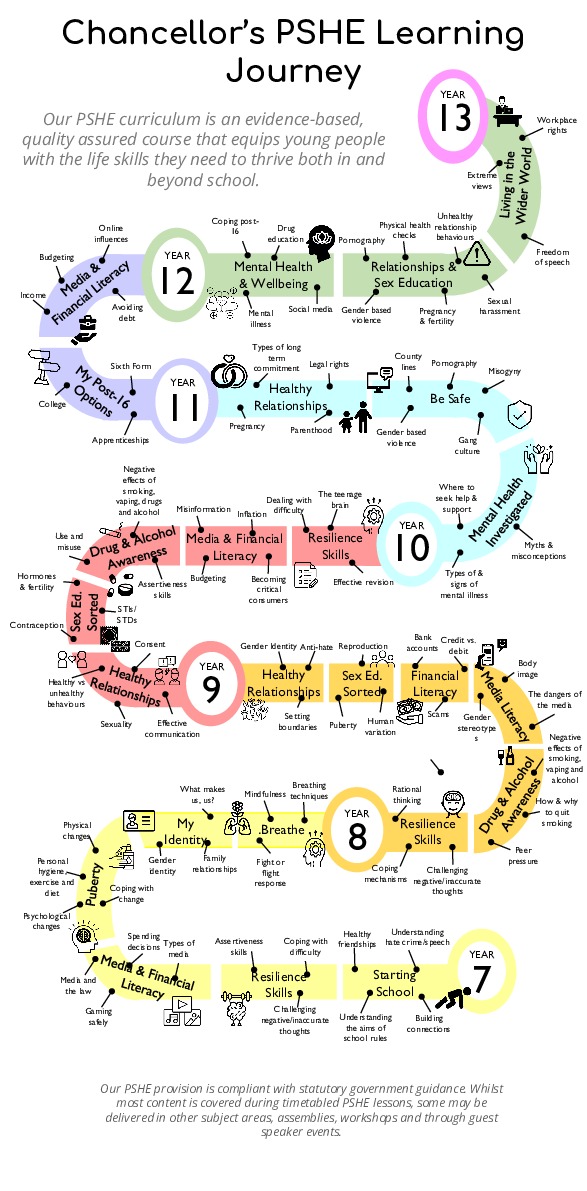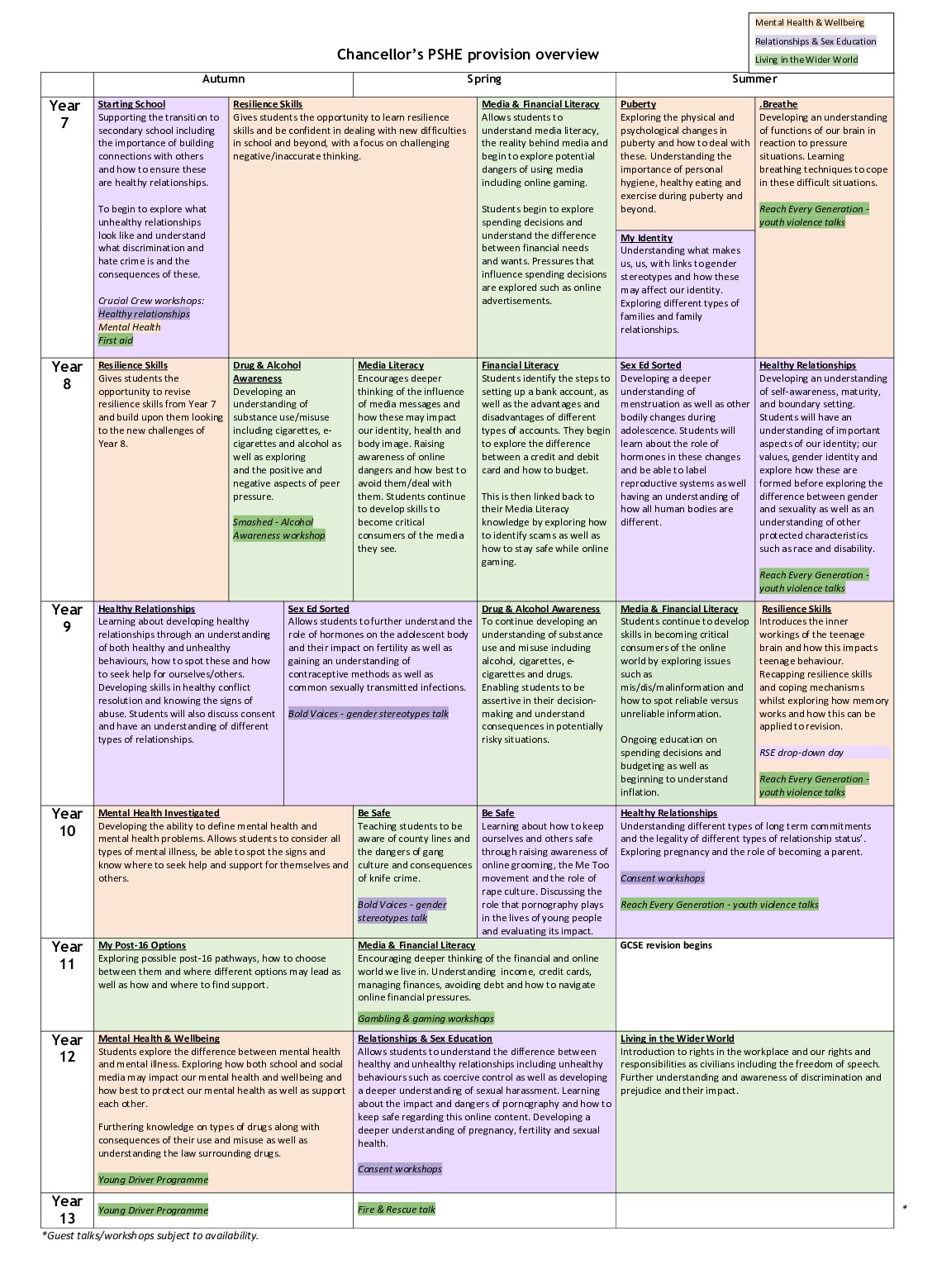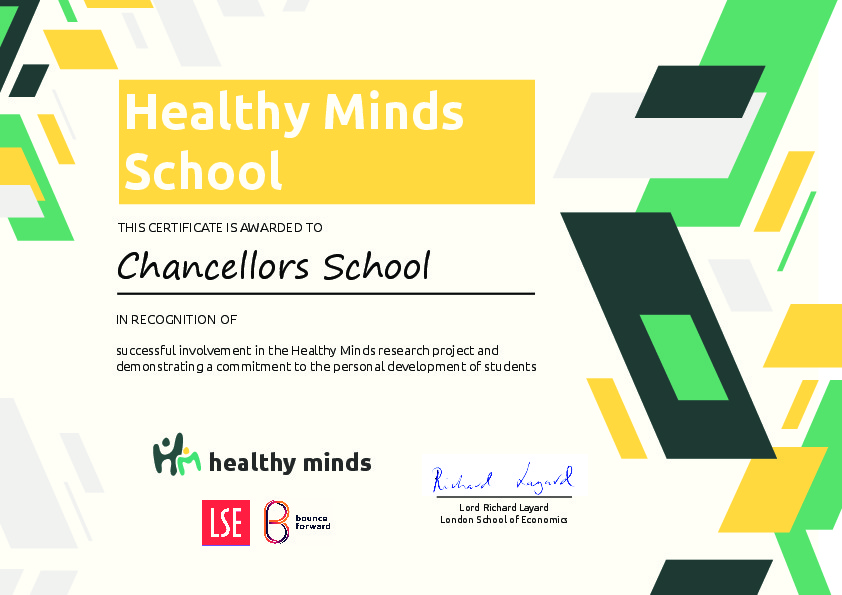PSHE and Healthy Minds
Year 7
During Year 7, students develop the cognitive and behavioural skills required to make the most of opportunities and deal with setbacks. These foundational skills are relevant now and transferable beyond school. Students learn about applying these skills to navigating the media and social media, as well as harnessing the potential of their mind, and increasing their attentional skills using mindfulness.
Year 8
Year 8 students will consider who they are now and who they hope to be as adults. They learn to set realistic goals that matter to them and bring the future nearer, so they can see that what they do now in school is directly connected to what they want for their future. In this context, they then think about the influences around them and debate issues of social norms, body image, tobacco and alcohol. Towards the end of the year, they also explore how their bodies are changing and how to create and sustain healthy relationships.
Year 9
In Year 9, students build on their learning to apply their new skills to developing positive relationships and consider the risks associated with unhealthy relationships. They discuss the health and emotional implications of sexual relationships and debate the impact of alcohol, tobacco and drug use and misuse. Using the skills and knowledge gained in Years 7 and 8, the focus is on making good decisions as life becomes more complicated.
Year 10
During Year 10, students will learn about mental illness and how to recognise it in themselves and those around them, as well as the stigma surrounding mental illness and when and how to seek help. They will explore the dangers online and in-person surrounding gangs, knife crime, pornography and sexual harassment. As the students are moving towards adulthood they will consider their values and levels of maturity as their relationships develop and they will explore the responsibilities of being a parent.
Year 11
Year 11 students will start the term by beginning to explore their post-16 options. This will happen both in PSHE sessions as well as through guest speakers and individual careers meetings. They then learn about financial literacy; understanding what is meant by income, learning how to budget effectively and how to avoid debt.
Year 12
Our Sixth Form students begin by understanding mental health and illness. This is done by addressing misconceptions and tackling stigmatisation. They then explore unhealthy behaviours such as coercive control and sexual harassment; how to spot these, the law surrounding these behaviours and where to seek help. They also participate in a research task surrounding the dangers of pornography on relationships and body image. This is followed by discussions on pregnancy, fertility and parenthood. The course ends by exploring life beyond Chancellor’s through understanding of workplace rights, drugs and discrimination.


Healthy Minds Research Project 2013-2018
Chancellor's School is proud to announce that its involvement in the Healthy Minds research project has led the school to being awarded the kitemark, only achieved by schools who successfully met all the criteria of the project to a consistently high standard. This milestone is a major move forward in our mission to deliver the best personal, social and health education available and evidence of our ongoing commitment to the personal development of our students.
Overview
Healthy Minds is an evidence-based health and relationships curriculum for years 7-10 that is equipping young people with the life skills they need to thrive in and beyond school. This unique study helps us understand the impact that good quality teaching and learning can have on important outcomes, and how to create a culture of resilience where teachers and students thrive.
Background
Starting as a research project by the London School of Economics and Bounce Forward, Healthy Minds was funded by the Education Endowment Foundation and trialled in 34 schools over 5 years. Building on learning from the project and feedback from teachers and students, the curriculum is now available to all schools.
As Lord Richard Layard, London School of Economics has said, “Young people need to develop healthy minds and schools should make it a top priority. It is the most outstanding wellbeing curriculum in the world”.
Results
The curriculum consists of 113 lessons over four years and includes topics such as resilience, mental health, social media, mindfulness, sex education, alcohol and drug awareness, relationships, decision making, media awareness and more. Students across the 34 schools involved in the research project completed questionnaires before and after completing the curriculum, here are the results:
Click here to learn more about the Healthy Minds Research Project


